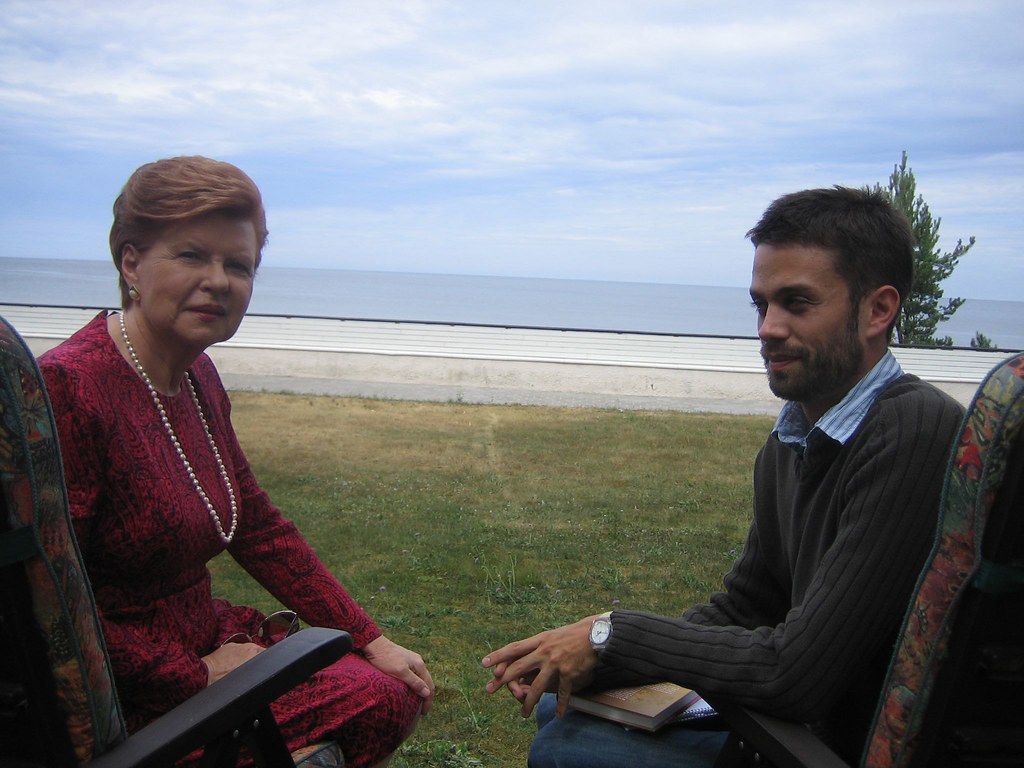
Latvia’s longest serving president, Vaira Vike-Freiberga, left office last month with an emotional goodbye speech to the people. She became President of Latvia in 1999. Although not a candidate in the first ballot, she was drafted by the Saeima (Latvian Parliament) and was elected to the office of President of Latvia. She was sworn in on 8 July. Her election coincided with the offer of European Union (EU) membership to Latvia at the EU Summit at Helsinki 1999.
Latvia’s president is elected for four years and the duties include foreign affairs and defense. The president also can propose legislation and can return measures approved by the Saeima for reconsideration.
Born in Riga in 1937, she was forced to live in exile most of her life, like so many other members of the Latvian elite. After growing up in refugee camps in Germany, she went to a French school in the French protectorate of Marocco, and then studied in Canada, where she became a professor of psychology in 1965.
Her views are said to be quite conservative though she has no political affiliation. She is also a strong supporter of the U.S. policy in Iraq and on various occasions she has asked that Russia admit to the Soviet occupation of the Baltic States. Her relationship with the russian-speaking comunity was, however, difficult. When she took over as a presidente promised to learn Russian language, but she never did, as she explained to me in our second, and last, interview at her residence in Jurmala in July 2006.
Cosmopolis keeps record of her views of russian problem.
For centuries, Latvians were under German, Swedish, Russian and later Soviet domination. This has created today's strong nationalism among Latvians which even led to some problems with the European Court of Justice. I pointed out to the president that 15 to 17% of the people living in Latvia do not have the Latvian nationality, even though most of them were borne here. Most of them are Russians who moved here after the Second World War, during the Soviet occupation and colonisation.
Vike-Freiberga responded that Latvia's nationality laws are not very different from the ones in Germany, where Turkish immigrants - sometimes even third-generation residents - do not automatically receive the German nationality. She is right, but I had no time to point out that Germany applies ius sanguinis instead of ius solis, contributing to its serious immigration and minority integration problem; therefore, can rarely be cited as an example to follow.
However, the president came up with some substantial arguments in favor of her position. She pointed out to the fact that, at the moment Latvia regained its independence after decades of Soviet military occupation and that it took Latvians five years more to get the Red Army to leave. In that situation, the president explained, giving the occupiers automatic citizenship would have meant sanctifying the occupation and accepting its legitimacy.
She always felt that history was not being re-written by acknowledging that the Soviets had occupied the three Baltic nations and that, for Latvia, the end of World War II meant the occupation by one foreign totalitarian regime being replaced by the occupation by another foreign totalitarian regime.
Vike-Freiberga was certainly a thorn in the side of the political elite. She dominated the Latvian political stage from 1999 to 2007, and achieved unheard-of levels of popular support from a jaded public that is typically suspicious of the political class. Indeed, her success was largely based on her status as an outsider – a retired psychology professor from the French-speaking University of Montreal in Canada, she had been resident in Latvia for less than a year when elected president. As Daunis Auers, teacher at the department of political science at the University of Latvia writes for Transitions Online: "She devoted most of her presidency to foreign affairs, believing that Latvia’s future security would be guaranteed by rapid accession to the European Union and NATO",
In Latvia, if nowhere else, she was seen as a major international player. This also meant that she rose above the grubby infighting of the Latvian political scene. As a result, she was an inspirational figure, representing the Latvia that many wanted to see – sophisticated, intellectual, and punching above its weight – rather than the Latvia that actually existed.
What she will do now?




No comments:
Post a Comment